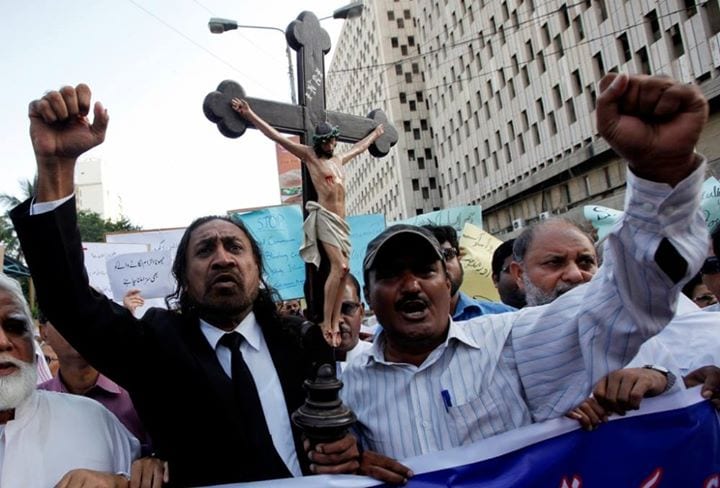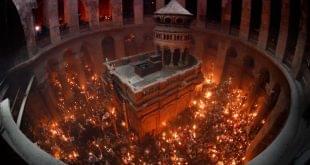Herland Report: It is estimated that about one-third of the globe’s population suffers from religious persecution.
By the numbers, Christians are the most persecuted religious group in the world.
We are seeing mass exoduses of Christians from Middle Eastern countries in which they are indigenous inhabitants.
An Italian study calculates that in 2016, a Christian was killed for his or her faith every six minutes. The trend is accelerating. A 2016 Pew Research report found that Christians were targeted in 144 countries, up from 125 in 2015.
The Christian persecution NGO Open Doors revealed in its 2019 Watch List Report that within five years the number of countries classified as demonstrating “extreme” persecution went from one (North Korea) to 11. According to the Center for Studies on New Religions (CESNUR), 70 per cent of them were victims of tribal conflict in Africa alone, writes Barbara Kay for The National Post.

The CESNUR study’s findings have been fleshed out in far greater depth by the Interim Report of an Independent Review into the global persecution of Christians by the Bishop of Truro, the Rt. Rev. Philip Mounstephen, conducted at the behest of Jeremy Hunt, Britain’s Secretary of State for Foreign and Commonwealth Affairs, and delivered at the end of April.
A final report will be delivered in June, but the scope and nature of the problem is amply distilled herein.
RELATED ARTICLES:
- Near Genocide of Christians in the Moslem World.
- Christians are under siege across the world.
- Islamic Persecution of Christians seldom criticized in the West. #Soleimani.
- Sunday with Denzel Washington: Have faith, never give up.
- Historic Churchillan Moment: Boris Johnson signs BREXIT deal.
The research does not cover Christians’ plight in Europe or Eurasia, but it does drill down into many other regions: the primary hot spot of the Middle East and North Africa (MENA), as well as in India, China, North Korea, Latin America, Indonesia and Malaysia.
It covers all forms of discrimination and persecution, from relatively minor forms such as refused permission for church construction or burial rights, or limited access to education and employment, to more aggressive forms — church vandalism, anti-Christian bigotry in school textbooks, harassment on state-sponsored media (escalating in Iran, Iraq and Turkey, where the governing AK Party depicts Christians as a “threat to the stability of the nation”), and imprisonment of clerics — all the way up to church bombings, pogroms and genocide.
Christians with a Muslim background are particularly susceptible to persecution or even execution.
In Israel, not mentioned in the report, about 172,000 Christians flourish and practice their faith freely. It seems pretty clear that as religious fundamentalism continues to spread in the Middle East, tolerance for minorities will wane.
In countries like Iran, Algeria and Qatar, the state is the main actor, while in Syria, Yemen, Saudi Arabia, Libya and Egypt, Christians suffer at the hands of both state and non-state Islamist actors, the report says.

If current trends continue, the region may be virtually cleansed of Christians within a few years. From 1948-70, MENA ethnically cleansed its 800,000 mostly Sephardic Jews.
They were, in a state of traumatic deracination, absorbed by Israel, sparing them, in retrospect, the far worse fate they would have suffered under numerous civil wars and ISIL.
Blasphemy laws are presently in place in 71 countries, and they, too, are having an effect on Christians’ ability to express their beliefs.
The report points to the highly publicized case of Asia Bibi, for example, a Pakistani Christian who was sentenced to death for allegedly having blasphemed Islam, and only saved by the worldwide attention her case received, as well as to the unjust trial of Iranian priest Ebrahim Firouzi who was arrested in March 2013 on charges of “promoting Christian Zionism.”
In his introduction, the Bishop notes that the horrific Sri Lanka massacre of Christians occurred while the report was in its final stages, observing sadly that “this report will be out of date even by the time that it is published.”
As religious victimhood is one of the great themes of this progressive era, one might think that this disturbing escalation in prevalence and severity of anti-Christian hatred would attract media alarm and anguished public discussion, especially in such nations as ours, built by believing Christians and dominated by Christian principles.
But, as London’s former chief rabbi Jonathan Sacks told the House of Lords: “The persecution of Christians throughout much of the Middle East, sub-Saharan Africa and Asia (and) elsewhere is one of the crimes against humanity of our time and I’m appalled at the lack of protest it has evoked.”
There is plenty of protest amongst ordinary Christians. The “lack” — and it is indeed appalling — is found amongst nominally Christian elites, including politicians who readily express indignation over hate crimes against Jews and Muslims, but refer to slain Christians as “Easter worshippers,” elites who are keen to legislate a “day of remembrance and action against Islamophobia,” but are too progressively “woke” to condemn the objectively horrific problem of global Christophobia.
The level of censorship in social media and search engines is all-time high. Do like thousands of others, subscribe to The Herland Report newsletter here!
Led by Scandinavian bestselling author, Hanne Nabintu Herland, The Herland Report news and opinion website provides independent analysis from leading Western intellectuals and ground breaking YouTube interviews, cutting through the mainstream media rhetoric. It is a great place to watch interviews and read the articles of leading intellectuals, thought leaders, authors and activists from across the political spectrum. The Herland Report believes in freedom of speech and its editorial policy resides above the traditional Left vs Right paradigm which we believe has lost its relevance and ability to describe the current driving forces in Western politics.









